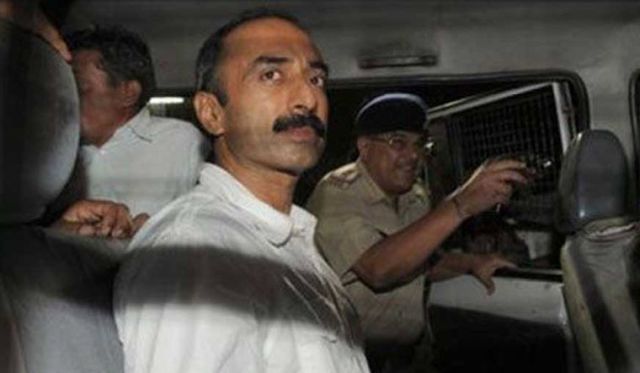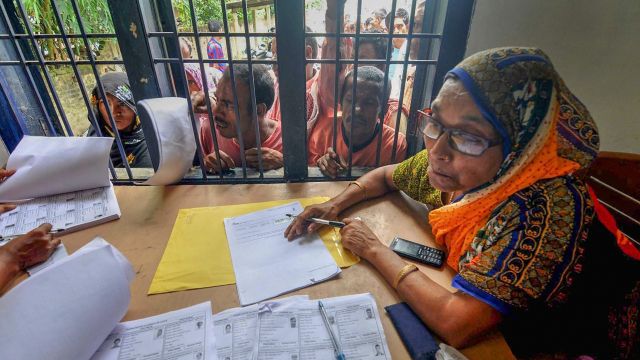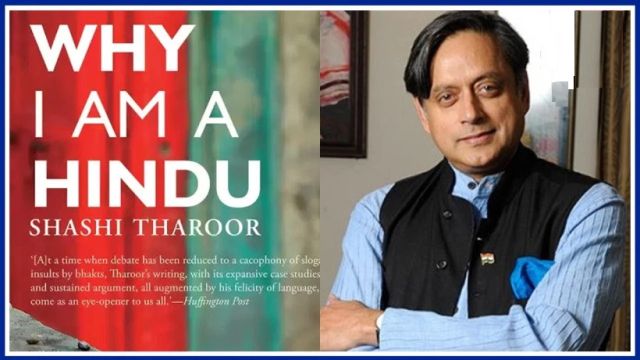
by admin | May 25, 2021 | News, Politics
 By Vishnu Makhijani,
By Vishnu Makhijani,
New Delhi : Religion is blamed for the “dirt it carries” but the fault lies elsewhere, says a timely new book on the subject given the difficult period India and the rest of the world is going through.
“Religion, as usually understood, is the outcome of the dynamics of spirituality, playing freely in a society. But unlike the world of matter, where the outcome of various forces working on an object can be predicted to precision, the forces of society, working out the application of spirituality, cannot be predicted to satisfaction,” writes Samarpan, a monk of the Ramakrishna Mission, in “The World of Religions” (Niyogi Books/pp 284/Rs 450).
The human mind is free and therefore has different levels of purity and unselfishness. Just as the purity of religion depends on the nature and character of its followers, the “not-so-noble” minds “invariably add dross to a religion” due to their incompetence and greed, writes the author, whose assumed name is Swami Samarpanananda, an alumnus of St. Stephen’s College, Delhi.
“The onlookers blame religion for the dirt it carries but the fault lies somewhere else” — in materialism — says the author, who examines in detail eight major world religions: Hinduism, Buddhism, Jainism, Sikhism, Zoroastrianism, Judaism, Christianity and Islam.
It’s quite “fascinating”, says the author, that every one of these has originated from Asia, today an area of major religious divide.
Noting that the present age, and possibly the coming years, belongs to materialism, Samarpan says “superficiality in the name of rationality, licentious in the name of freedom, greed in the name of a free market, and bloodbath in the name of ideology has grown to monstrous proportions” in what is his sixth book, even as the seventh is well on its way.
“Today, when every other young person believes in the truism ‘religion is irrelevant’, its standing in this e-age looks shaky. Will the high-tech generation of the future have anything to do with religion? Will they throng places of worship as their ancestors did?
“The answer is an emphatic yes,” maintains the author, who grew up in a traditional but liberal family in Bihar and studied in Delhi.
How did this book come about?
“When I joined the Ramakrishna Mission as a monk, some 40 years ago, a senior monk told me that it would be natural for me to know about my religion, but to grow I must read the sacred books of other religions too. That is how I got into studying about other religions with respect.
“It was fascinating for me to note how the masters from different religions were talking quite similarly (not entirely, though) about religion and religious experiences. This continued for most part of my life,” Samarpan told IANS in an interview.
Noting that it has been in his nature to explore the world of ideas by holding on to an idea as the rope to ascend that fascinating world where ideas are in their raw form, not limited by words or hindered by thoughts, he said: “It is this world in which a writer loves to meander to meet the unexpected and the unexplored. True creativity and originality come by moving effortlessly in this realm.”
Lamenting that the “blip and click” lifestyle of today does not allow the time to go deeper into subjects, Samarpan said: “Today we have a very narrow understanding of most subjects, including our own religion. And, we are hopelessly ignorant about other religions. Ignorance is the mother of all narrowness and intolerance.”
“So, I put years of my studying and contemplation into creating ‘The World of Religions’ with the hope that readers may have a quick overview of their own religion, as also that of other religions. As you might note, the book is a beautiful harmony of information, analysis and synthesis born of rigors and refined by the wisdom of masters,” he added.
What then is the essence of each of the eight religions he has written about?
“Every religion accepts that life is not merely about birth and death. The true nature of world is consciousness, known variously as God, Atman, Nirvana, etc. If one wants, one can attain that supreme state by making a sincere effort here and now. Real tranquility in life comes only after one has known his/her true nature that lies beyond worldliness.
“The goal of every religion is to make a person divine. Society, rituals, customs, etc., are secondary details. The fight all around that we see in the name of religion is not to be divine, but to impose one’s narrowness on others. How can someone who loves God be cruel towards the creation of God?
“True religion demands growth in solitude. This makes the mind calm, peaceful, loving and inclusive,” the author replied.
What of the future?
“I am more into thinking than into writing. I sincerely believe that ideas catch hold of you when your mind is calm and ready to hold it. When an idea enters you, it starts growing, and when it grows beyond the critical mass, it needs to be put down on paper. So, writing for me means waiting for ideas to grow slowly for years, and hence I don’t make plans, nor do I create projects for myself.
“For the present, I do have some powerful ideas taking up my mental space. So, I think some more books may come out. In fact, I am about to complete my seventh book “The Hindu Way: A manual for the Hindus”.
“Being a monk, I need to leave my future plans in the hands of the Divine, who, unknown to us, takes care of us and slowly but surely draws us towards Him by making us outgrow the world through our experiences,” Samarpan concluded.
(Vishnu Makhijani can be contacted at vishnu.makhijani@ians.in)
—IANS

by admin | May 25, 2021 | News, Politics
 Ahmedabad : The CID Crime Branch of Gujarat Police on Wednesday arrested dismissed IPS officer Sanjiv Bhatt in a 1996 case relating to falsely framing a lawyer in a narcotics peddling case.
Ahmedabad : The CID Crime Branch of Gujarat Police on Wednesday arrested dismissed IPS officer Sanjiv Bhatt in a 1996 case relating to falsely framing a lawyer in a narcotics peddling case.
The CID picked up Bhatt and seven others, including two former police officers, following directives from the Gujarat High Court.
“Sanjiv Bhatt was initially detained for questioning and shortly after that he was arrested by CID while others are still under detention,” Director General of Police (CID) Ashish Bhatia said.
Going by the details of the case, lawyer Sumersingh Rajpurhoit was arrested by Bhatt in 1996 with a kg of drugs and booked in a case under the Narcotics Drugs and Psychotropic Substances (NDPS) Act.
Bhatt was then serving as the District Superintendent of Police in Banaskantha district.
Police claimed that the drugs were found from the room of a hotel that was occupied by Rajpurohit. However, an investigation by Rajasthan Police later revealed that the lawyer was falsely implicated in the case.
This, Rajasthan Police claimed, was done to compel the lawyer to let go a disputed property at Pali district in Rajasthan.
The Rajasthan Police also claimed that Rajpurohit was abducted by Banaskantha Police from his residence at Pali.
Following this investigation, former Banaskantha Police Inspector I.B. Vyas moved the Gujarat High Court in 1999 demanding a detailed probe in to the incident.
The court in June handed over the probe to the CID and asked it to complete the investigation within three months.
Bhatt, who has been a vocal critic of Prime Minister Narendra Modi on social media platforms, has had several spats with the ruling establishment in the state since the 2002 communal riots.
In 2011, Bhatt even filed an affidavit in the Supreme Court, accusing Modi of being complicit in the 2002 riots.
Bhatt was dismissed from the Indian Police Service in 2015 for “unauthorized absence” from service. Bhatt even met fasting Patel quota stir leader Hardik Patel last week and extend his support for Hardik’s cause.
“I have been fighting for justice for over two decades now and those responsible for my suffering have been arrested today,” lawyer Rajpurohit told reporters.
—IANS

by admin | May 25, 2021 | News
 New Delhi : The Delhi High Court on Wednesday asked a senior officer of Haj Committee to appear before it and respond on a plea seeking quashing of the guidelines issued for Haj from the year 2018 to 2022, as it debars persons with disabilities from applying for the Haj pilgrimage.
New Delhi : The Delhi High Court on Wednesday asked a senior officer of Haj Committee to appear before it and respond on a plea seeking quashing of the guidelines issued for Haj from the year 2018 to 2022, as it debars persons with disabilities from applying for the Haj pilgrimage.
A bench of Chief Justice Rajendra Menon and Justice V. Kameswar Rao said no one from the Haj Committee appeared before it despite the fact that a notice was issued.
The bench directed the Chief Executive Officer to be present before it on November 1, the next hearing. It warned of action if he failed to appear before the bench.
The court was hearing a plea filed by lawyer Gaurav Kumar Bansal, who alleged discrimination in the new guidelines, issued on November 27 last year, as they violate the the Rights of Persons with Disabilities Act (RPWDA) 2016, which has equality and non-discrimination as its guiding principle.
The Ministry of Minority Affairs has opposed the plea saying that such persons were likely to suffer the most in case of an accident or stampede.
—IANS

by admin | May 25, 2021 | News, Politics
 New Delhi : The Supreme Court on Wednesday chose 10 identity proof documents from a list of 15 to be accepted as a valid claim of people left out of the final draft of Assam’s National Register of Citizens (NRC) and sought the views of the Centre and other stakeholders on the issue.
New Delhi : The Supreme Court on Wednesday chose 10 identity proof documents from a list of 15 to be accepted as a valid claim of people left out of the final draft of Assam’s National Register of Citizens (NRC) and sought the views of the Centre and other stakeholders on the issue.
The bench of Justice Ranjan Gogoi and Justice Rohinton Fali Nariman picked up the 10 documents suggested by the Assam State co-ordinator of NRC Prateek Hajela for dealing with the claims of about 40 lakh people, left out of the NRC, for their inclusion in the list.
Justice Nariman said that the 10 chosen documents will be authentic and other five can be created.
The bench refused to give Attorney General K. K. Venugopal a copy of the report submitted by the Hajela to the Court in a sealed cover.
As the Attorney General repeatedly urged the Court to give the government a copy of the report carrying 15 suggested documents, Justice Gogoi said: “The Attorney General has sought the report of the State co-ordinator of NRC… At this stage we are of the view that what we have indicated in our order is sufficient.”
“The government may be interested. We want to balance the interest of all the stakeholders,” the Court told Venugopal as he insisted that “government is extremely interested” in knowing the report.
The Court told the Attorney General that they are extracting 15 suggested documents and also the 10 documents they have chosen are in their order and the government can have those from it.
Seeking the response of the Centre and other stakeholders on the suggested 10 documents that can be relied upon to back the claims for inclusion in citizens register, the Court fixed September 19 for the next hearing.
The court extended the date of the commencement of filing of claims and objections.
As per the schedule, the filing of claims and objections was to commence on August 30 but same was extended on August 28 to a “later date from the proposed one, namely 30th August, 2018”.
Besides the Centre, the Court has also sought the response of other stakeholders including Assam Public Works, Assam Sanmilita Mahasangha, National Democratic Front of Bodoland (Progressive), Indigenious Tribal Peoples Federation, All Assam Bhojpuri Parishad, Joint Action Committee for Bangali Refugees, All Assam Minorities Students’ Union (AAMSU) and Jamait Ulama-i-Hind.
In its August 16 order, the court had asked the eight stakeholders to submit their views on the standard operating procedures prepared by the Centre setting out modalities for the claims and objections to the final draft of the NRC.
Hajela’s report was in pursuance to the August 28 order of the court asking him to apprise it of the ramification of the Centre’s position that the people left out of the final draft of the NRC be given another chance to establish their claim for inclusion in the list.
The move by the Centre also included changing the legacy and tinkering with the family tree.
The Court had asked Hajela to submit a “comprehensive report indicating the feasibility including the time taken and the advantages/disadvantages that may accrue if the aforesaid modification/change of legacy is permitted”.
—IANS

by admin | May 25, 2021 | Books, News, Politics
 New Delhi : Politician and author Shashi Tharoor’s book “Why I Am A Hindu” will be made into a web series with National Award-winning producer Sheetal Talwar as showrunner. The Congress MP will also narrate it.
New Delhi : Politician and author Shashi Tharoor’s book “Why I Am A Hindu” will be made into a web series with National Award-winning producer Sheetal Talwar as showrunner. The Congress MP will also narrate it.
Taking head-on the current misinterpretation and misappropriation of Hinduism, Tharoor’s book is about the history of Hinduism and its core tenets, as well as socio-cultural developments in India that relate to Hinduism and his own religious convictions.
The book is a repudiation of Hindu nationalism, and its rise in Indian society, which relied upon an interpretation of the religion which was markedly different from the one with which he has grown up, practiced and had studied.
On its adaptation, Tharoor said in a statement to IANS: “In any time and era, an adaptation of this book into film would be relevant, but in the current political, social and cultural environment it is imperative that the message of true Hinduism – the Hinduism of acceptance reach the widest audience possible.”
“I am glad that Sheetal and I – who share a similar belief system – are collaborating on this effort,” he added.
Talwar, who will be seen producing in India after nearly 7 years, says when she gave “Why Am I A Hindu” a read, it shook him.
“I was ashamed that as someone whose profession is to voice, I had not raised my voice and done nothing while the inherent integrity of our pluralism was being threatened.
“After ‘Dharm’ and ‘Rann’, it is after years that I have been so excited about a subject. I am glad that I could convince Shashi to not only make this into a web series, but also offer his time as a narrator to the series.”
The series will headline numerous known filmmakers film an episode each. It is set to be made in various Indian languages and will be released in the first quarter of 2019, the statement read.
—IANS





